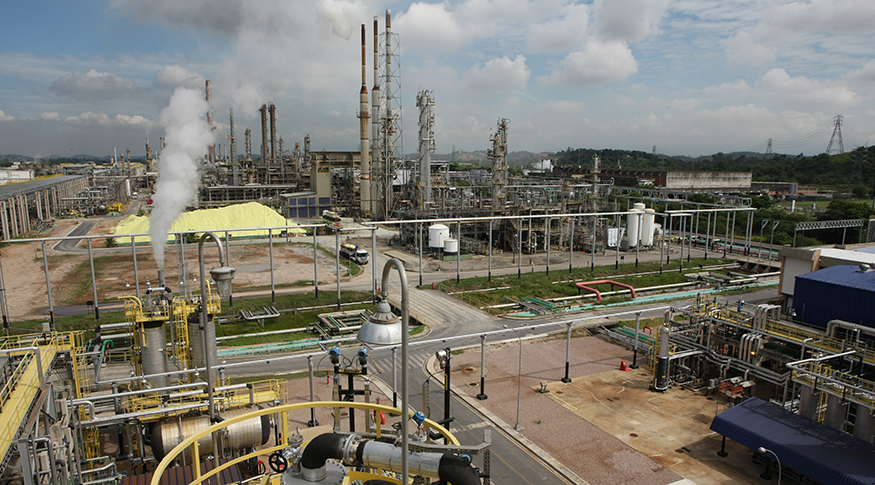IPP
Industrial prices change -0.36% in April, third drop in a row
June 06, 2025 09h00 AM | Last Updated: June 06, 2025 11h47 AM

The sector of petroleum refining and biofuels was the one that mostly negatively influenced the April´s IPP - Picture: Andre Motta de Souza/Agência Petrobras
The prices of the national industry registered a negative change of 0.36% in April over March (-0.60%), the third consecutive month of drop after a series of 12 positive figures in a row. Therefore, the Producer Price Index (IPP) rose 7.27% in 12 months, whereas the cumulative index in the year stayed at -0.93%. The monthly rate had been 0.67% in April 2024.
The Producer Price Index (IPP) of the Mining and Manufacturing Industries measures the evolution of the prices of products "at the factory gate", free from taxes and freight, and encompasses the broad economic categories.
In April 2025, eight out of 24 industrial activities surveyed recorded negative price changes when compared with the previous month, following the change of the overall industry. In March, 11 activities had shown lower average prices in relation to February 2025. The data were released today (6) by the IBGE.
Compared with March, the sector that mostly influenced was Petroleum refining and biofuels, accounting for -0.35 percentage points (p.p.) of influence in the change of -0.36% of the overall industry. Other activities that also stood out were mining and quarrying industries, with -0.20 p.p. of influence; Food products, with 0.18 p.p.; and Other chemicals, with -0.09 p.p.
"Notice that Food products was the only positive influence among the highlights. It is a different situation than that noticed in March, in which its influence was negative and the most intense one," explains Alexandre Brandão, Manager of Analysis and Methodology of the Division of Short-Term Statistics in Enterprises.
Brandão also highlights that the sector of petroleum refining "was already negative in March, though with less influence (-0.06 p.p. out of -0.60%). At that time, the products that stood out were not those with the highest weight in the calculation of the sector. In April, the drop in the prices of that sector stepped up and the main influence came from diesel fuel, the product with the highest weight in the sector, with more than 45%."
On the other hand, the sector of Food products (0.72%) registered a positive change for the first time in the year. As a result, the cumulative index in the year was -2.27% against -2.97% in March. In the cumulative index in 12 months, the change was 13.19%.
According to Alexandre Brandão, the shift from a negative change in March to a positive one in April is particularly linked with the fact that the price of fresh or cooled beef advanced positively, which is in line with a smaller contingent of heads available for slaughtering.
"It should also be highlighted the depreciation of the real against the dollar (0.6%), which did not happen since December 2024. The positive influence of coffee remained. In a moment of increasing demand for soybean grains, the price of soybean oil is on the positive side as well. Among the highlights, rice, whose harvest is underway, was the only product whose prices dropped," highlighted the manager.
Mining and quarrying industries (-4.43%) recorded the most intense change among the activities surveyed. As a result, the cumulative index in the year stayed at -12.33% (it was 1.64% in April 2024) and, in 12 months, at -9.42% (the most intense since July 2023, -28.32%). It was the most intense change both in the monthly figure and in the cumulative index in the year (-0.20 p.p. out of -0.36%), the first one in the cumulative index in the year (-0.59 p.p. out of -0.93%) and the fourth one in the cumulative index in 12 months (-0.47 p.p. out of 7.27%), in this indicator, the only negative change among the four highlights. "In the case of mining and quarrying industries, the domestic market follows the movement of the foreign market, whose major products in that sector have a downward trend. The April´s figures highlighted that sector," emphasizes Brandão.
Among the broad economic categories, the price changes in April over March 2025, which was -0.36% in the overall industry, were the following: 0.01% in capital goods (BK), -1.23% in intermediate goods (BI), and 0.83% in consumer goods (BC), being the change reported in durable consumer goods (BCD) of 0.21% and that in semi and non-durable consumer goods (BCND) of 0.95%.
"As it can be seen, only intermediate goods reported a negative price change and its monthly influence (-0.68 p.p. out of -0.36%) was offset by consumer goods (0.31 p.p.), especially by non-durable consumer goods (0.30 p.p.). Of the ten products that mostly influenced the monthly result of intermediate goods, only two had a positive influence (gold and soybean oil). The biggest impact came from diesel fuel, together with crude petroleum oil, both of them reducing their prices between March and April. In non-durable consumer goods, the positive change in the prices of beef and coffee were the major influences," complements Brandão.
Know more about the IPP
The IPP aims at measuring the average change of sale prices received by the domestic producers of goods and services, as well as their evolution over time, signaling the short-term inflationary trends in Brazil. It is a key indicator for the macroeconomic follow up and, consequently, a valuable analytical instrument for decision makers, either public or private.
The survey investigates, in a few more than 2,100 enterprises, the prices received by producers, free from tax, tariffs and freight, defined according to the most usual commercial practices. Six thousand prices are collected monthly. The complete IPP tables are available on Sidra. The next release of the IPP, related to May, will be on July 4.




















